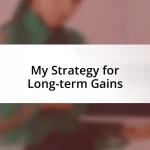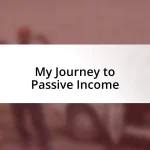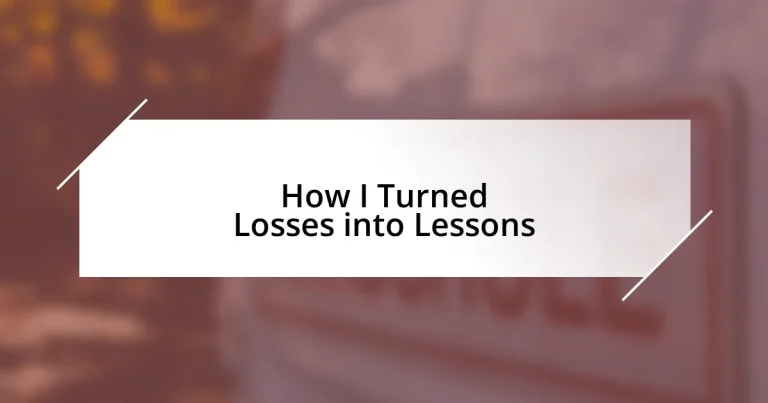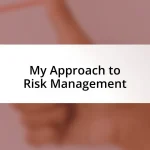Key takeaways:
- Personal losses can lead to profound self-discovery and personal growth, emphasizing the importance of community and shared experiences in healing.
- A shift in perspective regarding failures turns them into crucial learning opportunities, which fosters resilience and encourages continuous learning.
- Implementing actionable changes and establishing a feedback loop encourages collective problem-solving and drives improvement in personal and professional settings.
- Sharing lessons from setbacks cultivates a culture of openness and empathy, enabling individuals to connect and learn from one another’s experiences.
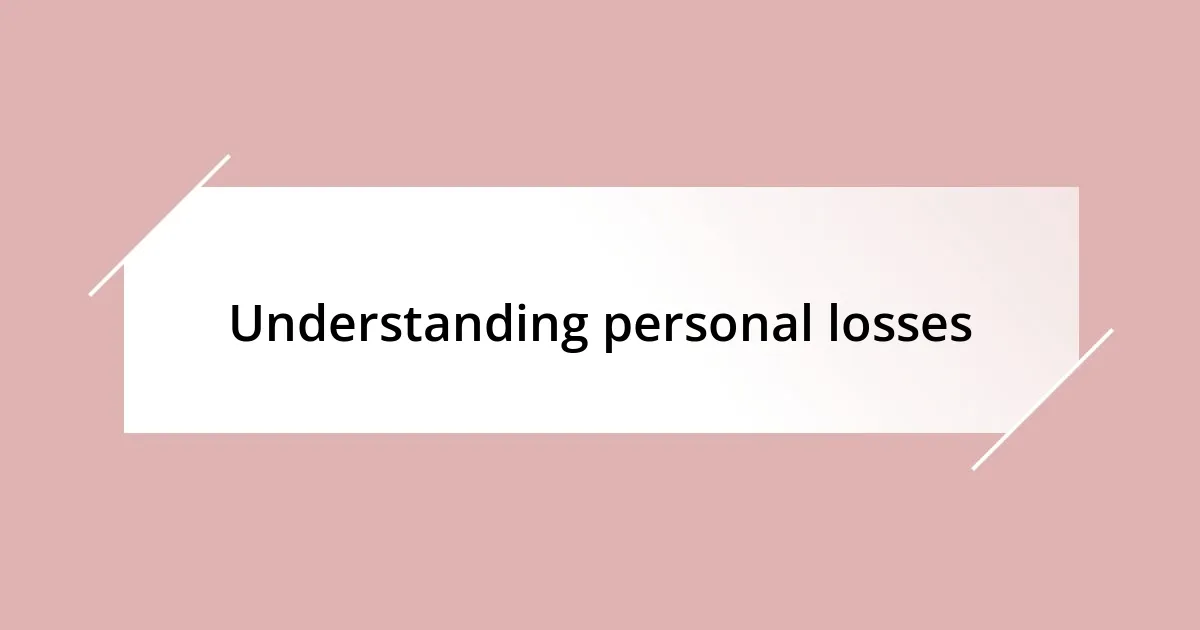
Understanding personal losses
Personal losses can feel like a deep hole, one that seems impossible to climb out of. I remember the day I lost a friend—suddenly, everything felt heavier, and I found myself constantly questioning my own resilience. How do we navigate the baffling emotions that come with such a loss?
When I reflected on my experiences, I realized that each loss is tied to lessons that often emerge in the shadows of grief. After losing my job unexpectedly, I felt adrift and uncertain, yet it pushed me to explore avenues I never considered before. Isn’t it interesting how life has a way of prompting us to grow even when we’re hurting?
Understanding personal losses means acknowledging the pain but also recognizing that it can lead to personal growth. I learned that sharing stories of loss with others not only helped me heal but also connected me with those who had similar experiences. Isn’t it comforting to know we aren’t alone in these struggles?
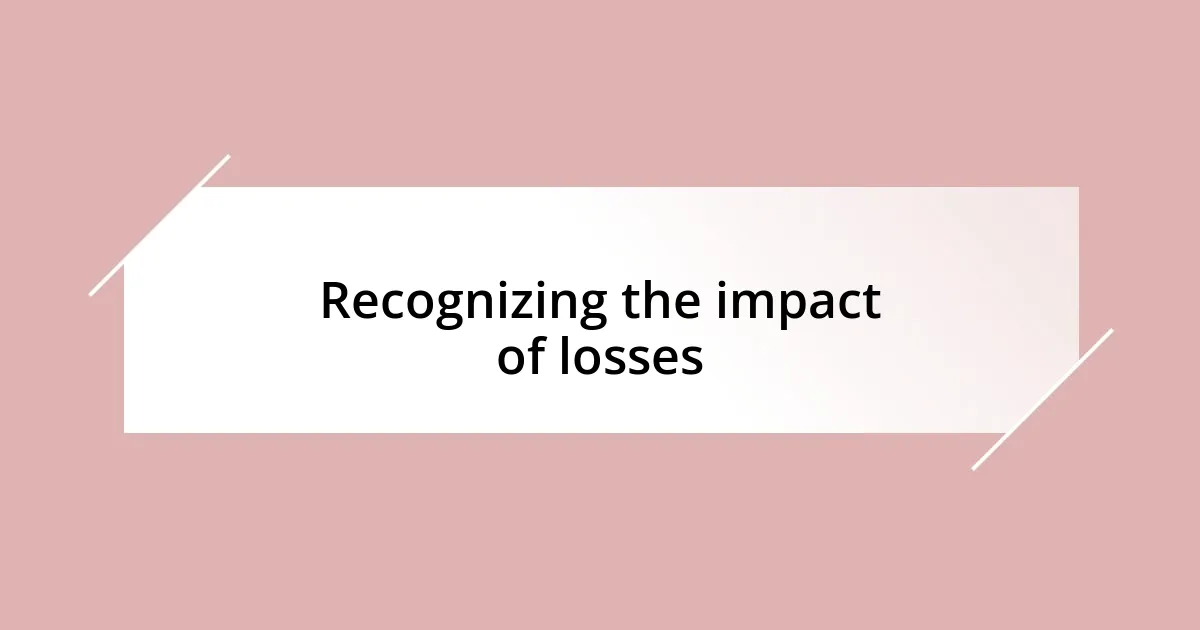
Recognizing the impact of losses
Recognizing the impact of losses begins with understanding how deeply they can affect our emotional landscape. I recall losing a cherished family heirloom; it wasn’t just an object but a vessel of memories. For weeks, I felt this gnawing emptiness that prompted me to examine what truly mattered in my life. Have you ever felt that sudden jolt when realizing the significance of something you took for granted?
Moreover, losses can serve as startling awakenings. I once faced the unexpected end of a long-term relationship. At first, it felt like I was swallowed by despair, but over time, I began observing how this loss revealed the areas of my life that needed attention. I gained insight into my own patterns in relationships and began to prioritize my emotional well-being. Isn’t it amazing how a seemingly devastating event can lead to such profound self-discovery?
Finally, acknowledging the impact of losses also opens the door to resilience. Through my experiences, I’ve learned that losses can be catalysts for change. Each setback forced me to reassess my values and desires, propelling me to chase goals I had previously sidelined. Reflecting on these moments can be quite liberating—how about you? What shifts have you noticed in your life following a significant loss?
| Type of Loss | Emotional Impact |
|---|---|
| Loss of a Loved One | Profound Grief |
| Job Loss | Identity Crisis |
| End of a Relationship | Self-Reflection |
| Loss of a Possession |
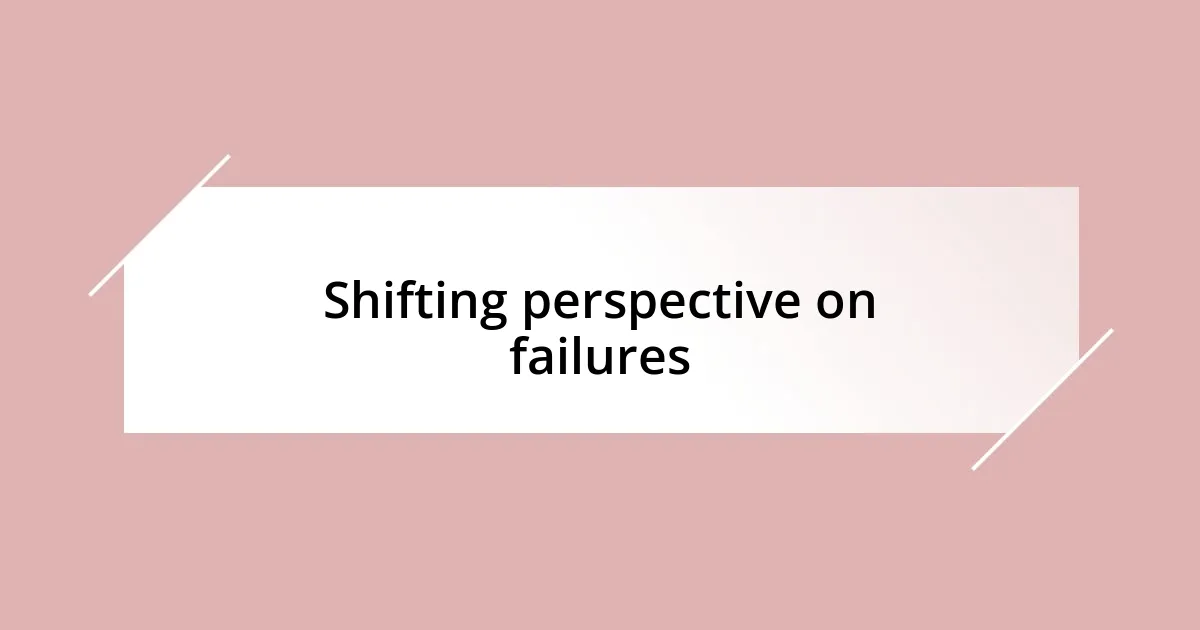
Shifting perspective on failures
Shifting my perspective on failures was a game-changer for me. I used to see failures as dead ends, reminders of my inadequacies. But then I started embracing them as essential learning moments. When I faltered in a project at work, instead of spiraling into self-doubt, I began asking myself, “What can I learn from this?” That simple shift opened up opportunities for growth I hadn’t previously considered.
- Embracing failures as learning experiences fosters resilience.
- Understanding mistakes allows for smarter decision-making in the future.
- Reframing negative moments can spark creativity and innovation.
- Share your learning process; it helps others feel less alone in their struggles.
Recognizing that every setback carries a lesson can be profoundly liberating. I remember a time when I botched a presentation—I felt like I had let everyone down. But in examining that experience, I discovered it revealed areas where I needed to improve. This perspective allowed me to approach future presentations with confidence and enthusiasm, as I saw them not as tests, but as opportunities to evolve. It’s interesting how failures can be the stepping stones toward our next successes, isn’t it?
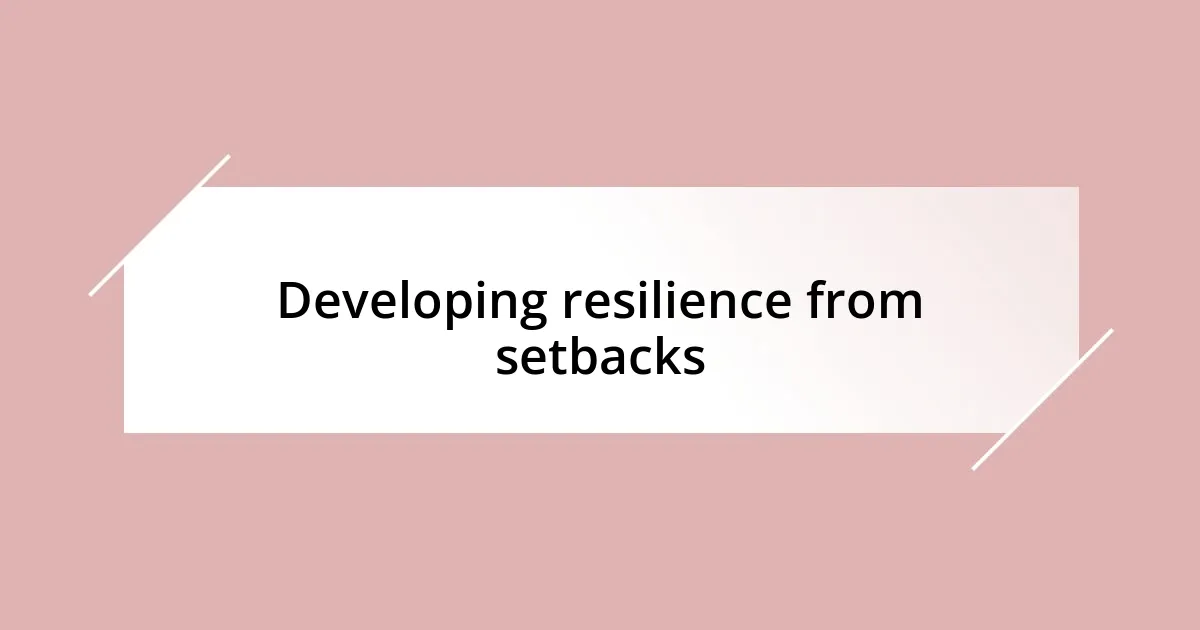
Developing resilience from setbacks
Resilience often sprouts from the harshest setbacks I’ve faced. I remember a period when I was both physically and emotionally exhausted after a project I poured my heart into failed to take off. Initially, the disappointment felt overwhelming, like heavy fog that clouded my vision. But in reflecting on what went wrong, I slowly uncovered valuable insights about team dynamics and my own leadership style. Isn’t it fascinating how a moment that felt like an end could become the groundwork for future successes?
I also learned that resilience is not just about bouncing back—but also about understanding the journey. After losing an important client, I was devastated. However, instead of withdrawing into my shell, I reached out to two mentors for guidance. This led to honest conversations about my business approach and even new strategies I hadn’t considered. Have you ever found strength in seeking outside perspectives during challenging times? It’s amazing how that vulnerability opened doors I didn’t even know existed.
Sometimes, the lessons from setbacks are revealed in the most unexpected moments. One day, while walking in the park after a particularly tough week, I saw a child fall off their bike. Instead of crying, the child laughed, brushed themselves off, and got back on to try again. That moment resonated with me; it reminded me that resilience is often a choice we can make even in the face of adversity. How often do we give ourselves permission to “get back on the bike” after experiencing failure? Embracing this mindset has allowed me to navigate life’s challenges with more grace and confidence.
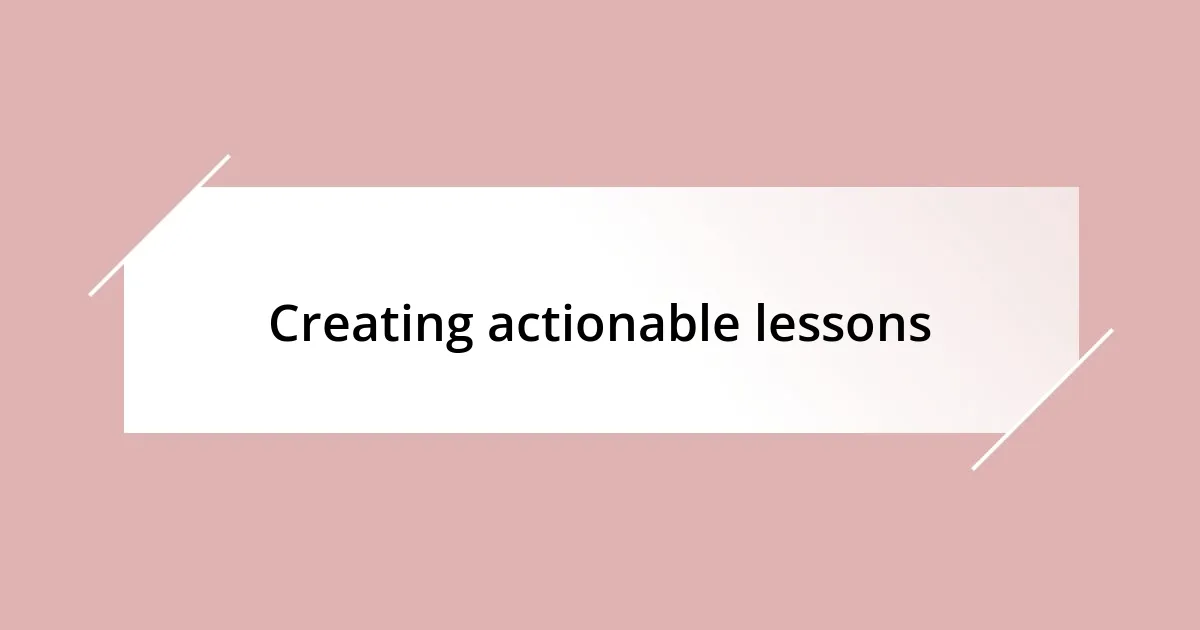
Creating actionable lessons
Creating actionable lessons involves a mindful process of distilling experiences into practical takeaways. I remember a time when I missed an important deadline at work. My initial reaction was frustration, but amidst the disappointment, I jotted down what went wrong. This simple act of writing not only helped me pinpoint the flaws in my time management but transformed that setback into a concrete action plan for future projects. Isn’t it remarkable how a bit of self-reflection can turn chaos into clarity?
One method that has worked wonders for me is the “three action items” approach. After any setback, I challenge myself to identify three specific changes I can implement moving forward. For instance, after losing a significant piece of business, I started dedicating time each week to re-evaluate my client relationships and communication strategies. The act of defining those steps not only empowered me but also sparked fresh ideas to prevent similar situations in the future. Have you ever taken a moment to crystallize your thoughts into actionable items? It can be a game-changer.
As I reflect on my journey, I realize how pivotal it is to share my lessons with others. I once spoke openly about the challenges I faced in launching a new product—how it flopped despite my best efforts. Surprisingly, my candidness encouraged my colleagues to share their own stories of failure. Each shared lesson was a reminder that we’re not alone in our struggles, and that collective wisdom can provide guidance. How often do we underestimate the value of community in learning from our losses? This willingness to engage and learn together can make all the difference in transforming setbacks into solid lessons.
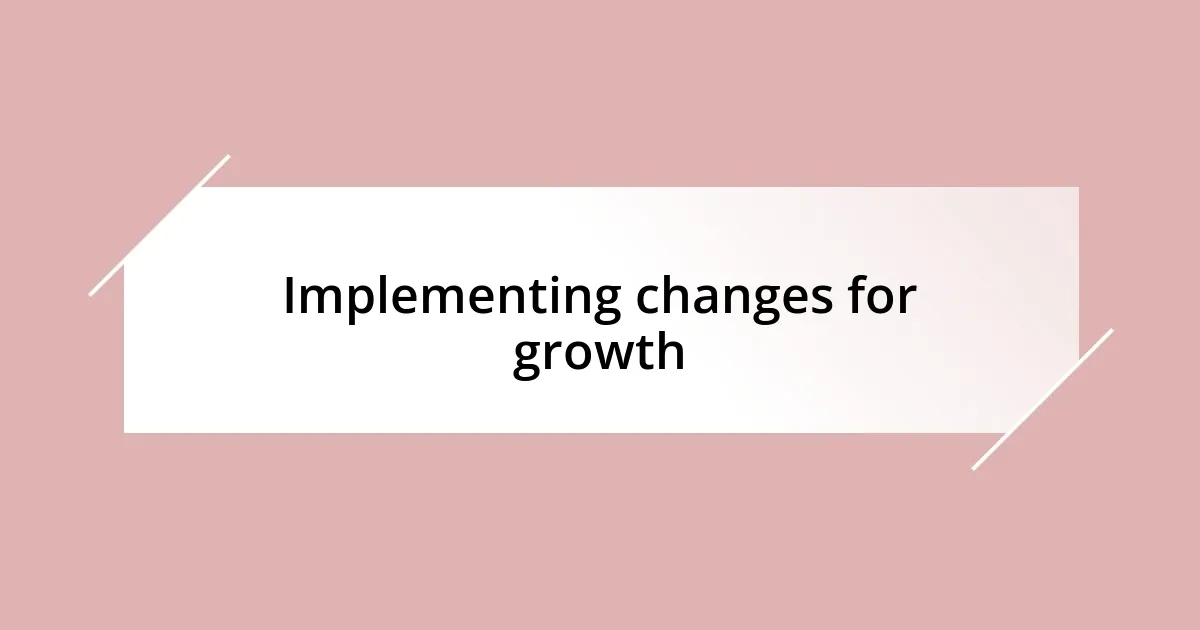
Implementing changes for growth
Implementing changes for growth is a crucial step in transforming setbacks into opportunities for improvement. I vividly recall a moment in my career when I faced a significant downturn in my team’s performance. Instead of playing the blame game, I gathered my team for an open dialogue. We dissected the issues, and through mutual trust, we turned our frustrations into a clear action plan. Isn’t it empowering to discover that sometimes the best solutions stem from collective brainstorming?
One of the changes I found most effective was establishing a feedback loop. After every project, I’d encourage my team to share what worked and what didn’t. At first, it felt awkward, like prying open a box of secrets. Yet, this vulnerability fostered an environment where everyone felt heard. I remember one of my team members pointing out that we rushed the initial stages of our projects. That insight led us to implement a “slow down to speed up” strategy, which greatly improved our outcomes. Have you ever noticed how slowing down can sometimes lead to faster, more effective solutions?
Another significant change I embraced was prioritizing continuous learning. When I stumbled during a presentation, my instinct was to shy away from similar situations. Instead, I signed up for public speaking workshops. The moment I stepped on stage again, I felt my pulse race, but this time with a sense of purpose. Each unsuccessful attempt was a stepping stone, reminding me that growth often comes from stepping out of our comfort zones. Have you experienced that exhilarating rush when you push through fear? Embracing challenges like these has created a culture of development and resilience in both my personal and professional life.
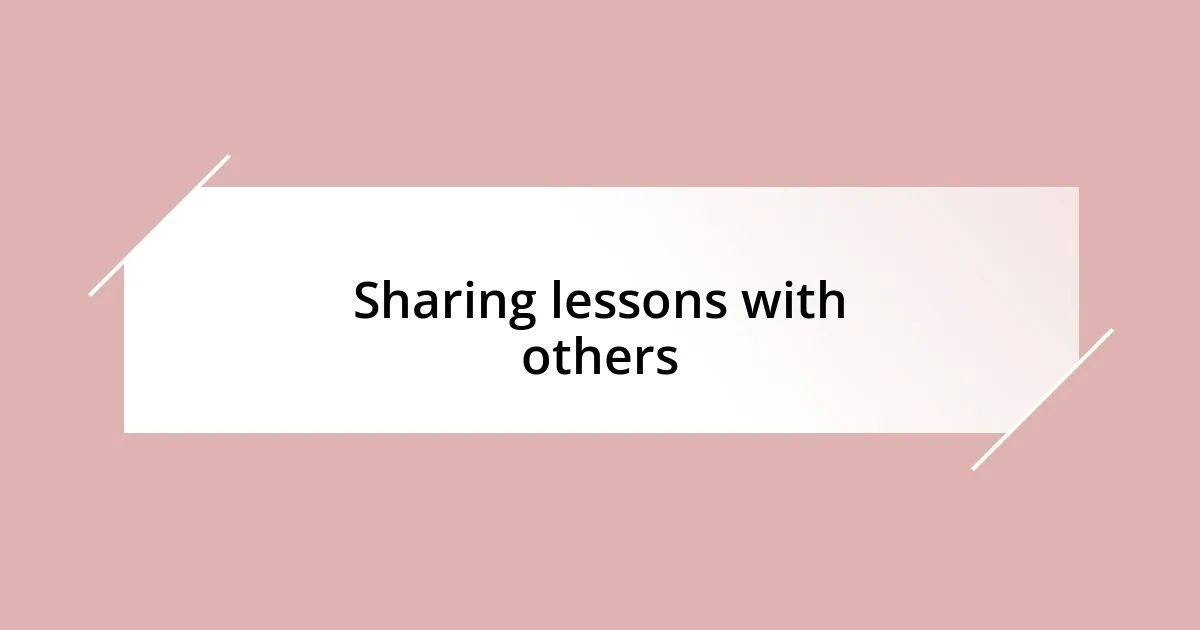
Sharing lessons with others
Sharing lessons with others is a powerful way to create connection and foster growth. I distinctly remember leading a workshop where I shared my daunting experience of pivoting in my career after a major setback. The room was filled with nods and murmurs of understanding as participants opened up about their own pivotal moments. It struck me then just how therapeutic this sharing can be—it’s like a collective release, allowing us to lighten our burdens while learning from each other’s missteps.
In my experience, the most profound insights often come from honest vulnerability. After initiating a small group discussion about our professional blunders, one person revealed how a failed project led them to reassess their passion for the industry. Their story resonated deeply with others, leading to a conversation about re-evaluating personal goals. Isn’t it fascinating how a single story can catalyze a deeper understanding among peers and redefine our objectives? I found that when we create spaces for sharing, we cultivate an environment rich in empathy and collaboration.
Moreover, I’ve seen firsthand how these shared lessons ripple outward, creating a culture of openness. When I mentor new team members, I make it a point to highlight my own failures and what they taught me. I recall telling one mentee about a point in my career where I felt completely lost. Instead of shying away from that timeframe, I used it as a teachable moment. By addressing my uncertainties, I hoped to inspire them to embrace their challenges too. Have you considered how your experiences could guide someone else? It’s amazing how sharing our lessons can become a beacon of hope for others navigating similar paths.









